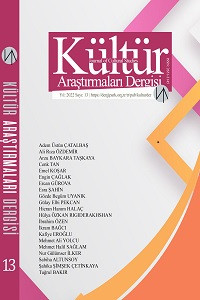Abstract
Harold Pinter’s first play The Room (1957) displays the characteristics of “the uncanny” (unheimlich) developed by Ernest Jentsch and Sigmund Freud. Jentsch’s dichotomy between the concepts of “new, foreign, hostile” and “old, known, familiar”, the tension between animate and inanimate entities, or machine-like beings have certain reflections in the play. His dichotomy is illustrated in the components of “the room”, “the couples”, “the man in the basement”, and “the blind Negro”. In a similar fashion, how Freud approaches to the concept of “the uncanny” resonates with the play. This is particularly clear in the components of “repressed feelings of earlier years”, “involuntary repetitions”, “the double pattern”. Therefore, this article argues that Pinter’s play portrays most of the characteristics of both Jentsch and Freud’s interpretation of the uncanny. Besides, otherness as a term contributes to the formation of the feeling of uncanny throughout the text by providing a robust reinforcement for its perception.
Keywords
References
- Dukore, Bernard F. (1982). Harold Pinter. London: Macmillan.
- Esslin, Martin (1976). Pinter: A Study of His Plays. New York: The Norton Library.
- Fanon, Frantz (2008). Black Skin, White Masks. London: Pluto Press.
- Freud, Sigmund (2003). The Uncanny. Trans. David McLintock. London: Penguin Books.
- Haraway, Donna J. (1991). Simians, Cyborgs, and Women. New York: Routledge.
- Honderich, Ted (1995). The Oxford Companion to Philosophy. New York: Oxford University Press.
- Jentsch, Ernst (1906). “On the Psychology of the Uncanny”. Trans. Roy Sellars. Angelaki, 2(1): 77-16.
- Kaya Erdem, Burcu (2019). “Freudyen Teorideki ‘Tekinsizlik’ Olgusunun Türk Modernleşmesinde Darbeleri Mümkün Kılan Obskürantist ve Self-Oryantalist Tutumlarla İlişkiselliği Üzerinden Okunması”. Türkiye İletişim Araştırmaları Dergisi, 32: 77-97.
- Miller, J. Mitchell (2015). “Otherness”. The SAGE Encyclopedia of Qualitative Research Methods. Ed. Lisa M. Given. Los Angeles/London: Sage, 588.
- Öğünç, Ömer (2018). “The Sense of Uncanny in Agatha Christie’s A Caribbean Mystery”. Afyon Kocatepe Üniversitesi Sosyal Bilimler Dergisi, 20(1): 149-163.
- Pinter, Harold (1991). Harold Pinter: Plays. London: Faber and Faber.
- Regal, Martin S. (1995). Harold Pinter: A Question of Time. London: Macmillan.
- Taylor-Batty, Mark (2014). The Theatre of Harold Pinter. London: Bloomsbury.
Abstract
Harold Pinter’ın ilk tiyatro oyunu olan Oda (1957) Ernest Jentsch ve Sigmund Freud tarafından geliştirilen tekinsiz (unheimlich) duygusunun özelliklerini taşımaktadır. Jentsch’in “yeni, yabancı, hasmane” ve “eski, bilinen, tanıdık” kavramları arasında; canlı ve cansız varlıklar veya makinemsi oluşlar arasındaki gerilimde tespit ettiği ikiliğin tiyatro oyununda karşılığı vardır. Yazarın bahsettiği ikilik “oda”, “çiftler”, “bodrumdaki adam” ve “kör zenci” bileşenlerinde resmedilmiştir. Benzer şekilde, Freud’un “tekinsiz” kavramına yaklaşımının yansımalarını oyunda görmek mümkündür. Özellikle “erken yıllardaki bastırılmış duygular”, “istemsiz tekrarlar” ve “çift örnekler” gibi bileşenlerde bunu görmek olasıdır. Dolayısıyla, bu makale Jentsch ve Freud’un “tekinsiz” kavramının yorumunun birçok özelliğini Pinter’ın tiyatro oyununun sergilediğini iddia etmektedir. Bunun yanı sıra, “ötekilik” terimi tekinsiz duygusunun oluşumuna güçlü bir algı meydana getirerek oyun boyunca katkıda bulunmaktadır.
Keywords
References
- Dukore, Bernard F. (1982). Harold Pinter. London: Macmillan.
- Esslin, Martin (1976). Pinter: A Study of His Plays. New York: The Norton Library.
- Fanon, Frantz (2008). Black Skin, White Masks. London: Pluto Press.
- Freud, Sigmund (2003). The Uncanny. Trans. David McLintock. London: Penguin Books.
- Haraway, Donna J. (1991). Simians, Cyborgs, and Women. New York: Routledge.
- Honderich, Ted (1995). The Oxford Companion to Philosophy. New York: Oxford University Press.
- Jentsch, Ernst (1906). “On the Psychology of the Uncanny”. Trans. Roy Sellars. Angelaki, 2(1): 77-16.
- Kaya Erdem, Burcu (2019). “Freudyen Teorideki ‘Tekinsizlik’ Olgusunun Türk Modernleşmesinde Darbeleri Mümkün Kılan Obskürantist ve Self-Oryantalist Tutumlarla İlişkiselliği Üzerinden Okunması”. Türkiye İletişim Araştırmaları Dergisi, 32: 77-97.
- Miller, J. Mitchell (2015). “Otherness”. The SAGE Encyclopedia of Qualitative Research Methods. Ed. Lisa M. Given. Los Angeles/London: Sage, 588.
- Öğünç, Ömer (2018). “The Sense of Uncanny in Agatha Christie’s A Caribbean Mystery”. Afyon Kocatepe Üniversitesi Sosyal Bilimler Dergisi, 20(1): 149-163.
- Pinter, Harold (1991). Harold Pinter: Plays. London: Faber and Faber.
- Regal, Martin S. (1995). Harold Pinter: A Question of Time. London: Macmillan.
- Taylor-Batty, Mark (2014). The Theatre of Harold Pinter. London: Bloomsbury.
Details
| Primary Language | English |
|---|---|
| Subjects | Creative Arts and Writing |
| Journal Section | Research Articles |
| Authors | |
| Publication Date | June 10, 2022 |
| Published in Issue | Year 2022 Issue: 13 |

